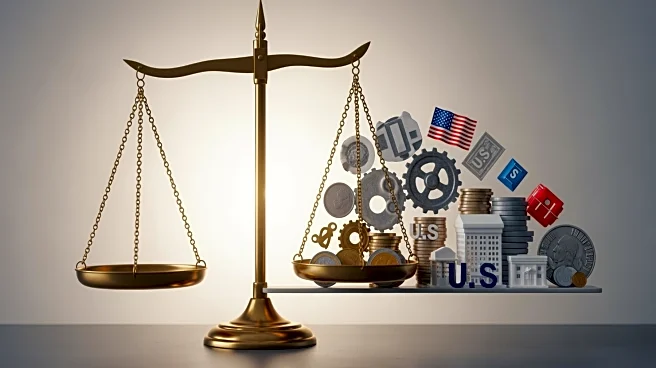What's Happening?
The Supreme Court is set to hear oral arguments in a significant case challenging President Trump's authority to impose tariffs on nearly all imported goods into the United States. This case, brought by
Learning Resources, a family-owned business that produces educational toys overseas, questions the extent of presidential power under the International Emergency Economic Powers Act (IEEPA) of 1977. The company argues that the tariffs, which have significantly increased their operational costs, were imposed without proper congressional approval. The lower courts have ruled against the Trump administration, but the tariffs remain in effect, impacting businesses like Learning Resources, which has seen its tariff expenses skyrocket from zero to $14 million in a year.
Why It's Important?
This case is pivotal as it tests the boundaries of executive power in regulating international trade, a domain traditionally overseen by Congress. The outcome could have far-reaching implications for U.S. businesses, particularly small and medium-sized enterprises that rely on imported goods. If the Supreme Court upholds the tariffs, it could set a precedent for future administrations to unilaterally impose similar economic measures, potentially destabilizing established trade practices and increasing costs for American consumers and businesses. Conversely, a ruling against the tariffs could reinforce congressional authority over trade policy, ensuring a more predictable and stable economic environment.
What's Next?
The Supreme Court's decision will be closely watched by businesses, policymakers, and international trade partners. A ruling is expected to clarify the scope of presidential powers under the IEEPA and could prompt legislative action to redefine or limit these powers. Businesses affected by the tariffs may need to adjust their supply chains and pricing strategies depending on the outcome. Additionally, the decision could influence future trade negotiations and the U.S.'s approach to international economic relations.
Beyond the Headlines
The case also raises broader questions about the balance of power between the executive and legislative branches of government. It highlights the potential for executive overreach in economic policy and the importance of maintaining checks and balances. The decision could impact how future administrations approach foreign policy and economic emergencies, potentially reshaping the landscape of U.S. governance and its interaction with global markets.










